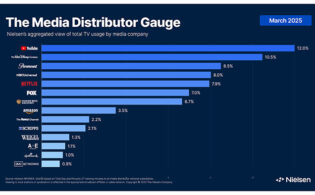While overall revenues slipped by 4 percent in Q3, Warner Bros. Discovery emerged from the year-ago loss of $417 million to post a profit of $135 million.
Total revenues for the period were $9.6 billion, a 3 percent decline excluding foreign currency fluctuations, with an adjusted EBITDA of $2.4 billion, a 19 percent reported decline.
“Warner Bros. Discovery’s Q3 results demonstrate once again that while we continue to confront extraordinary disruption in our environment, the strategy we have undertaken to ready Warner Bros. Discovery for future success is showing important results,” said CEO David Zaslav. “Thanks to our rapid international expansion and continued investment in high quality, diverse content, we saw momentum accelerate in our global direct-to-consumer business in Q3. In total, Max delivered 7.2 million net subscriber adds, the strongest quarterly gain since the platform’s launch, resulting in healthy subscriber-related revenue growth and meaningful progress toward achieving our 2025 direct-to-consumer segment financial objectives. Likewise, our recently announced strategic partnership with Charter Communications, for both linear network distribution and bundling of Max, not only reinforced the value of our content portfolio, but represented our willingness to work with our partners to enhance the consumers’ experience as our industry undergoes transformation.”
In the studios segment, revenues dropped by 17 percent to $2.7 billion, with content revenues down 18 percent to $2.5 billion as a result of a 40 percent decline in theatrical revenues and a 31 percent fall in gaming, with TV revenues up 30 percent. Adjusted EBITDA for the segment fell by 58 percent to $308 million.
At the networks, meanwhile, revenues rose by 3 percent to $5 billion, with ad revenues dropping 13 percent to $1.5 billion and distribution slipping 8 percent to $2.6 billion. Content revenues rose to $833 million, primarily driven by the sublicensing of Olympic sports rights to broadcast networks throughout Europe, which totaled $578 million. Adjusted EBITDA was down 12 percent to $2.1 billion.
Direct-to-consumer revenues were up 8 percent to $2.6 billion as the segment saw subs rise to 110.5 million—52.6 million in the U.S. and 57.9 million internationally. Distribution revenues were up 6 percent to $2.3 billion, driven by the subs gain and higher pricing, partially offset by continued domestic linear wholesale subscriber declines. Ad revenues gained 49 percent to $205 million. Content revenues fell 11 percent to $107 million, primarily driven by fewer third-party licensing deals. Adjusted EBITDA more than doubled to $289 million.





